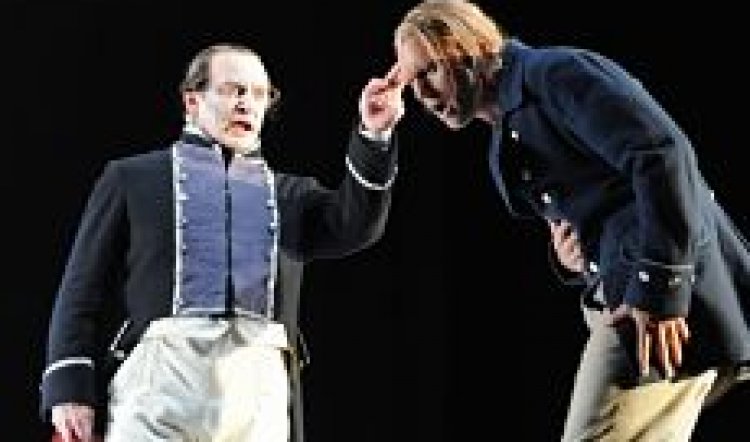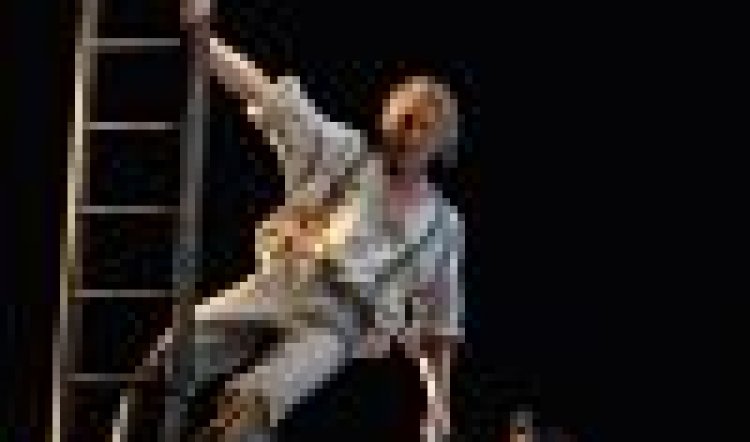
Billy Budd
Billy Budd Opera Australia at the Sydney Opera House, September 24-October 4, 2008; www.opera-australia.org.au
The collaboration between Benjamin Britten and EM Forster to fashion an opera from Herman Melville’s unfinished novella Billy Budd has given us one of the most fascinating and enduring “modern” operatic works. The layers of meaning, symbolism, philosophy and psychology offer endless reinterpretation and relevance; and it’s also quite simply, great entertainment and a rich musical experience.
Opera Australia’s current production, from the creative team of Neil Armfield (director) and Brian Thomson (designer), is as fresh and compelling now as it was on its first outing in 1998 and with John Wegner in the role of the malevolent Master at Arms Claggart and Teddy Tahu Rhodes as the tragically guileless Billy, it is even more engrossing.
On the surface Billy Budd is a simple morality tale of a naive young man whose faith in God and his captain is tried to the limits when he falls foul of a cruel and vengeful man. The surface, however, is barely worth the effort because beneath it there is so much more to explore and savour.
For a start there are the historic aspects: when Melville was working on the manuscript of Billy Budd, Sailor, in the mid-1880s, capital punishment was being debated in public and Billy was a potent symbol of a hideous method of punishment. At the same time, the story has uneasy echoes in the within-living-memory ramifications of the American Civil War (1861-65) that influenced so much of Melville’s writing. And the novella’s setting – in 1797 – also brought with it the subtext of the aftermath of the French Revolution, which scared the English establishment witless; while the Nore and Spithead mutinies in the Spring of that year were still causing conniptions on the poop decks of the Royal Navy’s fleet.
For Britten and Forster, coming to Billy Budd in the late 1940s, England was still in a grim way, post WW2, with food rationing in place and unemployment of men returned from six years of war at a high level. The optimism and economic booms of the late 1950s and 60s were some years off and an angelic hero such as Billy, who would be destroyed by a wicked man and an impotent upholder of the law was a bittersweet prospect.
In the past, much has also been made of the psycho-sexual drama of Billy Budd – the beautiful young man, adored by his sailor comrades, probably unconsciously lusted after by appalling Claggart and upright Captain Vere. Director Neil Armfield has not chosen this route and so its undeniable presence is even more powerful for not being overt. It could also be said that Billy is the symbol of Claggart’s repressed sense of right and wrong; that he represents the human and decent elements of a man and so becomes the inevitable object of Claggart’s hatred.

Then there is Billy’s stammer – his fatal inarticulacy in the face of lies and false accusations. In itself it is a formidable portrayal of what happens to the powerless in the face of implacable and amoral power: the common man is trampled underfoot. Symbolically Billy is the light on the hill, the hope for a better future; Claggart is the corrupt, the debased, the least attractive aspect of humanity. Captain Vere, on the other hand, is seemingly a “better” type of person in the sleight of hand way of the English aristocracy: noblesse oblige and benign paternalism being their skill and which saved them from a French-style revolt by the unwashed.
All in all, Billy Budd is one of the most complex, rewarding, captivating and genuinely tragic operas of all time. In this production all these elements are there and the performances by all the named cast members are simply splendid. The orchestra (conductor Richard Hickox) and massed chorus of some 60 men (chorus master Michael Black) are on top form and apply themselves to the music and action with precision and taste.
John Wegner’s Claggart is brilliant in its musing, icy understated portrayal of a helplessly unscrupulous man. If you loved him as Scarpia, you will shudder at Claggart. Teddy Tahu Rhodes brings a surprising and appealing boyish quality to Billy. That he looks angelic and utterly beautiful anyway is a bonus, but the performance is deeply thought out and the perfect dazzling sunlit foil for the black hole of Claggart. And Philip Langridge’s world-weary (rather than effete) and ultimately defeated Captain Vere is another beautiful, intelligent performance.
The setting of a naval sailing ship represented by a slowly and constantly moving deck – pitching and tossing on huge hydraulic lifts – is a simple and effective extra cast member. Nigel Levings’ lighting evokes storm tossed seas and the inner dark night of the soul and when Billy is eventually hanged it is made more awful by an act of lighting and imagination.
Billy Budd is not an easy night out but it has to be one of the most wonderfully rewarding in the current OA repertoire and with luck it will be around for many more years and cast changes to come.



